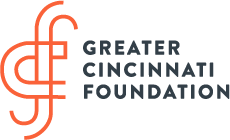Grantmaking Year in Review
In a year largely defined by uncertainty, fear and glaring illustrations of racial injustice, Greater Cincinnati Foundation (GCF) and the community’s generous donors and funders answered the call for support.
Like many organizations, the COVID-19 pandemic prompted us to double down on the community needs, particularly with our grantmaking strategies. We answered the call and built a process that enabled us to be nimble, accessible and move swiftly. We placed trust in our nonprofit partners at the forefront of our decisions. Throughout the year, we largely focused our support on four areas: COVID-19 regional response, racial justice and education, affordable housing and economic mobility.
COVID-19 Regional Response
The COVID-19 Regional Response Fund, activated by GCF and United Way of Greater Cincinnati, raised and deployed $7.3 million in emergency relief for more than 260 nonprofit organizations within three months in the spring of 2020. Beyond the COVID-19 Regional Response Fund, GCF also responded through grants focused on environmental and education needs to support COVID-19 response and relief needs in those sectors.
GCF’s education funding improved equity and quality of remote or hybrid learning, particularly focusing on the needs of our region’s Black and lower-income students. GCF worked to minimize the impact of the digital divide through the Connect Our Students initiative and the NKY Digital Equity Initiative – which have collectively provided free internet access to thousands of students in Cincinnati and Northern Kentucky and improved their educational access. Additionally, in a year where so much learning is happening outside the school building, GCF supported programs by community partners to help provide academic supports, either in-person or remotely, to improve educational access and support student success.
As people sought outdoor activities, GCF supported programs that gave low-income communities and people of color the opportunity to enjoy such endeavors in their neighborhoods. These programs supported the preservation and conservation of greenspace, educational opportunities that connected children and youth to nature and efforts to provide fresh food through horticulture and gardening.
Racial Justice and Education
Central to our mission, we deepened our commitment to making ours a more racially equitable region.
Notably, our Governing Board established the Racial Justice Fund in June with a commitment of $5 million over five years. The fund promotes matters of fairness and justice with a critical focus on the systems that affect the Black community. In September, we announced the first six recipients :Ohio Justice and Policy Center, Ohio Transformation Fund, National Development Council (Technical Assistance), MORTAR, The Heights Movement and Queen’s Village of Cradle Cincinnati.
In an effort to ensure our community has a shared understanding of systemic racism, we continued to host our Racial Equity Matters series, presented by bi3 and catalyzed by so many others this year. We surpassed our attendance goal and reached more than 1,300 participants. We also increased the amount of sessions offered to meet the growing regional demand for this crucial capacity-building opportunity.
We know that unfortunately communities of color disproportionally face barriers to voting. GCF supported organizations in their outreach and organizing efforts to ensure more voices were heard in November.
Affordable Housing
Hamilton County has a deficit of 40,000 housing units for our most severely cost-burdened residents. Cost-burdened families are those who pay more than 30% of their income for housing and may have difficulty affording necessities such as food, clothing, transportation and medical care. To address this crisis, in 2019, GCF convened leaders to build a long-term plan for improving accessibility to affordable housing. This convening resulted in the Housing Our Future: Strategies for Cincinnati and Hamilton County report, a comprehensive playbook that outlines 101 formal recommendations for what we can do as a region to address the housing crisis.
To further lift up this critical focus area, we also are providing a number of grants to support both the implementation of the strategies laid out in the Housing Our Future strategy and the provision of direct housing supports to our community.
Economic Mobility
We believe that supporting families in moving from poverty to self-sufficiency lifts us all. Because Black families face much higher barriers to upward mobility, economic mobility continues to be a strategic focus for GCF. Some of the initiatives we continue to fund to help improve economic mobility for families in our region include the Family Independence Initiative (FII) and Project LIFT (Lifting and Investing in Families Thriving). This year we also invested in Home Ownership Center’s Pathway to Economic Participation (PEP) initiative and ECDI’s Greater Cincinnati COVID Response Program.
FII trusts and invests directly in families by empowering them with financial and social capital to lift themselves out of poverty. At the close of our third year of support, participating families have seen a 20% increase in monthly income and have had an average increase in their monthly savings account balance from $53 to $1,163.
Project LIFT is a public/private partnership providing a flexible, family-driven approach to remove barriers families face on their journey to greater financial stability. As we end our second year of investing in Project LIFT, almost 16% (132 households) report at least a 20% increase in income.
The Home Ownership Center’s PEP program creates new pathways to economic mobility for low-wage workers through partnerships with the banking industry and employers. ECDI’s program supports small minority owned businesses disproportionately affected by the COVID-19 pandemic through technical assistance and loans.
As we begin 2021, we will continue our efforts to make Greater Cincinnati a more racially equitable place for all who call it home. We can only recover and thrive as a community if we all have the opportunity to do so.

